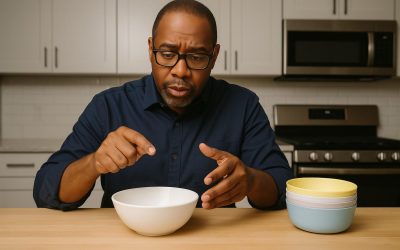As an Amazon Associate I earn from qualifying purchases.
In the realm of aromatic grains, jasmine rice holds a special place for its delightful fragrance and delicate flavor. A staple in many Asian cuisines, it’s cherished not only for its culinary versatility but also for its unique nutritional profile. A common inquiry among health-conscious individuals and those monitoring their dietary intake revolves around the calorie content of this popular rice variety. Specifically, understanding the caloric value of uncooked jasmine rice is crucial, as it forms the basis of numerous dishes across various culinary traditions.
A cup of uncooked jasmine rice, while seemingly unassuming, is packed with a significant amount of calories, primarily derived from carbohydrates. This energy content is a vital consideration for those managing their caloric intake for weight management or specific health conditions. In this article, we’ll explore the calorie count in a cup of uncooked jasmine rice, delving into its nutritional implications and how it compares with other dietary staples. Whether you’re a culinary enthusiast, a home cook, or simply looking to better understand your food choices, this insight into the caloric makeup of rice will provide valuable guidance for your dietary decisions.
How Many Calories Are In A Cup Of Uncooked Jasmine Rice?
A cup of uncooked jasmine rice, which typically weighs around 185 grams, contains approximately 640 to 680 calories. The exact calorie count can vary slightly based on the specific brand and any minor differences in cup measurements. Jasmine rice, like other varieties of white rice, is predominantly a source of carbohydrates, with these calories primarily coming from carbs. It contains minimal amounts of fat and a moderate amount of protein.
Expanding on the nutritional content of uncooked jasmine rice:
- Carbohydrates: The majority of the calories in uncooked jasmine rice come from carbohydrates. A cup of uncooked jasmine rice contains about 140 to 150 grams of carbohydrates, providing a substantial source of energy.
- Protein: Jasmine rice also contains a moderate amount of protein. In one cup of uncooked rice, there are typically about 12 to 14 grams of protein.
- Fat: There is a small amount of fat in jasmine rice, generally around 1 to 2 grams per cup of uncooked rice.
- Fiber: While not a significant source of dietary fiber, uncooked jasmine rice does contain a small amount, typically around 1 to 2 grams per cup.
- Micronutrients: Jasmine rice provides small amounts of various vitamins and minerals, including B vitamins, iron, and manganese. However, because jasmine rice is often a white rice variety, some of the nutrients are lost during the milling process. Enriched varieties may have some nutrients added back in.
- Glycemic Index: Jasmine rice has a higher glycemic index, which means it can cause a quicker spike in blood sugar levels compared to lower glycemic index foods.
- Serving Size Consideration: It’s important to note that a cup of uncooked rice will yield about three cups of cooked rice. Since rice expands when cooked, the calorie content per cup will be significantly less once the rice is prepared.
- Culinary Uses: Jasmine rice is a staple in many Asian cuisines and is known for its fragrant aroma and slightly sticky texture when cooked, making it ideal for dishes like curries, stir-fries, and as a base for various sauces and toppings.
In summary, while uncooked jasmine rice is high in calories, it provides a good source of energy and can be part of a balanced diet when portion sizes are controlled and it is complemented with other nutritious foods.
Frequently Asked Questions (FAQ’s)
Here are some expertise-based questions and answers regarding the calorie content in a cup of uncooked jasmine rice:
Q: How many calories are in a cup of uncooked jasmine rice?
A: A cup of uncooked jasmine rice, which generally weighs around 185 grams, contains approximately 640 to 680 calories. The exact number can vary slightly depending on the specific brand.
Q: Why is there such a high calorie count in uncooked jasmine rice?
A: The high calorie count in uncooked jasmine rice is primarily due to its high carbohydrate content. Rice is a dense source of carbohydrates, which are the body’s primary energy source, contributing significantly to the total caloric value.
Q: Does the type of jasmine rice affect the calorie content?
A: The calorie content in different types of jasmine rice (white jasmine rice vs. brown jasmine rice) can vary slightly. Brown jasmine rice may have slightly fewer calories due to its higher fiber content, which contributes less usable carbohydrates.
Q: How does the calorie content change when jasmine rice is cooked?
A: When jasmine rice is cooked, it absorbs water and expands in size, which significantly lowers its calorie density. The calories in a cup of cooked jasmine rice are much lower than in a cup of uncooked jasmine rice.
Q: Are the calories from jasmine rice considered healthy?
A: The calories from jasmine rice are primarily from carbohydrates, with small amounts of protein and minimal fat. While jasmine rice can be a healthy part of a diet, especially when paired with vegetables, lean proteins, and healthy fats, it’s important to consider overall dietary balance and portion sizes.
Q: Is jasmine rice a good option for weight management diets?
A: Jasmine rice can be included in a weight management diet if portion sizes are controlled. Considering its high carbohydrate content, it should be balanced with other lower-calorie, nutrient-dense foods.
Q: What nutrients contribute to the calorie content in jasmine rice?
A: Carbohydrates are the main nutrient contributing to the calorie content in jasmine rice. There are also small contributions from proteins and, to a lesser extent, fats.
Understanding the calorie content and nutritional value of uncooked jasmine rice is important for meal planning and maintaining a balanced diet. While jasmine rice is a staple in many diets, awareness of portion sizes and how it fits into your overall nutritional intake is key.
Conclusion
In conclusion, understanding the caloric content of uncooked jasmine rice is crucial for those who are mindful of their dietary intake and energy balance. A cup of uncooked jasmine rice, weighing around 185 grams, contains approximately 640 to 680 calories, predominantly from carbohydrates. This high-calorie count reflects the energy density of rice as a carbohydrate-rich food, making it a significant source of energy in many diets.
For individuals focusing on weight management or monitoring their carbohydrate intake, portion control and balance with other food groups are essential. Jasmine rice, while a nutritious and flavorful choice, should be complemented with a variety of other foods like vegetables, lean proteins, and healthy fats to achieve a balanced diet. It’s also important to consider how jasmine rice fits into your overall daily caloric and nutritional needs.
In summary, jasmine rice can be a part of a healthy and balanced diet when consumed in appropriate portions, especially when balanced with other nutrient-dense foods. Its role as a staple in many cuisines worldwide is not just due to its appealing aroma and taste, but also its ability to provide a substantial source of dietary energy.






